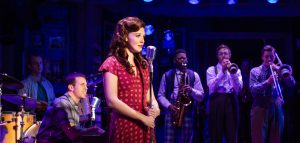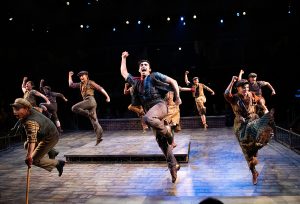Six students and alumni from Georgetown and Howard University are spending this academic year developing their own plays during the 2020/21 season of Arena Stage’s Barbara Walton Playwrights’ Arena. Under the guidance of dramaturg Jocelyn Clarke, the students will each write a full-length play and learn about the creative process and careers in the arts.
Since its establishment in 2013, Playwrights’ Arena has supported a cohort of local professional playwrights each year to further their artistic and professional development. This year, the program adjusted in light of the pandemic to focus on bringing together students from Georgetown and Howard interested in theatre and looking to push their projects a step further. Offered to university students for the first time, Arena Stage Deputy Artistic Director Seema Sueko said, “The partnership between Arena Stage, Georgetown University, and Howard University will build upon and serve to strengthen a pipeline of diverse future theater-makers and playwrights.”
Rose Dallimore (SFS’22), Fatima Dyfan (COL’21), and Timmy Sutton (COL’20) were classmates in last year’s Hope Playwriting Seminar with professor Christine Evans at Georgetown. The theatre departments at both universities reached out to students, including those three, about the program at Arena Stage.
Dallimore, who hadn’t been involved with theatre on campus until the playwriting class, jumped at the opportunity to participate in a creative space with her peers. “I have a long way to go in developing what Jocelyn is calling my ‘philosophy of theatre,’ which is daunting to me,” she said, but “thinking creatively in general is so refreshing, and I think it strengthens me even if I don’t pursue playwriting professionally.”
Dyfan, meanwhile, is immersed in theatre—she’s working on a minor in theatre and performance studies and is the long-time executive producer of the Black Theater Ensemble (BTE). She has taken the chance to work on her senior thesis play through the Arena Stage program, receiving feedback from Clarke and the other students in the cohort.
“I needed some kind of artistic community,” Dyfan said. “I wanted my play to be constantly interacting with people, and this was the best way for me to have that setup.”
Dyfan’s experience joining BTE and leading it to greater membership over the years helped drive her interest in theatre as a student. Through an autobiographical theatre class and working in many leadership roles on shows for BTE, she began to see theatre as a vehicle for more than stories. I knew I wanted to do a piece that was kind of helping all of us heal through our experiences that we’re having now,” Dyfan said.
The group first met in September after sending introductions and writing samples over email in the weeks prior. Since then, the cohort has met as a group three times to discuss each other’s ideas together and offer suggestions. In between, the playwrights also meet individually with Clarke to pose any questions they have or talk more specifically about developments in their work. In the monthly meetings, “It feels like all of us are on that simultaneous journey into figuring out the things we want to write about and the way we want to sound,” Sutton said.
Sutton began working in student theatre and writing plays of his own at Georgetown after meeting a group of close friends in the community and being asked to help assist and lead a number of technical roles in productions. He directed nomadictheatre’s spring show, John, and had his work featured in a number of Donn B. Murphy One Acts Festivals.
“I was most excited about getting to hang out with Howard students and see how they’re approaching theatre, and see who their influences are and how they think of and see my work,” he continued, noting that experiences with students in theatre programs at nearby universities were limited during his time at Georgetown.
Dyfan also mentioned the benefits of showing her work to a broader community. In the playwriting seminar last semester, she said, she sometimes struggled with her white peers misunderstanding the “Black sound” in her plays. “It just reminded me that when I’m putting out art, it is meant to be criticized and interact with different people,” she said. “I really want what I write for my thesis to be something anybody could pick off a bookshelf and want to read it. “
In between group sessions, the playwrights also meet with Clarke one-on-one for more specific advice on their particular works. “It’s very Socratic, and he asks a lot of questions,” Dallimore said. “And because we’re all in varying stages of development for our work, I would say his primary job is to question what we’re working on right now, present questions for us to answer to the group as well.”
Clarke’s own career in theatre has spanned disciplines and continents. Theatre advisor to the Arts Council of Ireland for 10 years, Clarke has also taught dramaturgy at the Kennedy Center, Columbia University, and Trinity College Dublin. In his other professional work, Clarke has written a number of plays for different theatre companies and worked as a dramaturg with dozens of writers across theatre and television.
Dyfan praised Clarke’s style for helping her move forward in her work. “He’s very available and hands-on. You never know what I say to you that’s going to make you have an idea that you just run with, so I love that he says what’s on his mind and asks the questions on his mind,” she said.
For Dallimore, working in a group of other students helps her stay motivated over the course of the year-long program, taking inspiration from everyone’s unique approaches to their plays. Her own play focuses on public grief consciousness and celebrity deaths. “It’s trying to raise the question of who owns grief, especially in internet culture,” she said.
These themes may seem particularly salient in a year where the COVID-19 pandemic continues to rage. Dallimore acknowledged the pandemic has directly and indirectly affected the creative process. “There’s definitely a lot of existential pressure behind the work we’re doing right now, which makes sense. And a lot of people are interested in playing with medium in unique ways,” she said.
Some of those themes are present in Sutton’s work as well. “I’m looking to talk about isolation and loneliness and how those things are tied to wealth,” he said of his play. After reading articles about billionaire Doomsday preppers in the context of the pandemic, and considering how that response is indicative of other societal problems, Sutton decided to bring that storyline to his dramatic work.
As an audience, he says, it could be easy to deride the billionaires’ thinking. “But what’s interesting to me is how, particularly during the pandemic, that same instinct for using our wealth as a form of protective isolation is something we’re all doing to the degree that we can do it,” he said. “It’s separating us from the service industry even more than we already are—this is something we were doing pre-pandemic too—where we just don’t want to see the people who are doing the actual labor that makes our lives and the way that we live them in 2020 possible.”
By the end of the 2020/21 season, the students expect to have completed a work of their own and learned more about their individual creative approaches.
“I hope the participants build community with one another,” Sueko said. “I hope they get to know themselves better as writers, and find the program rigorous, liberating and illuminating.”
Editor’s note: Dallimore is a current Voice staffer. Sutton was a Voice staffer before graduation. This article has been updated to reflect the full name of the program.





